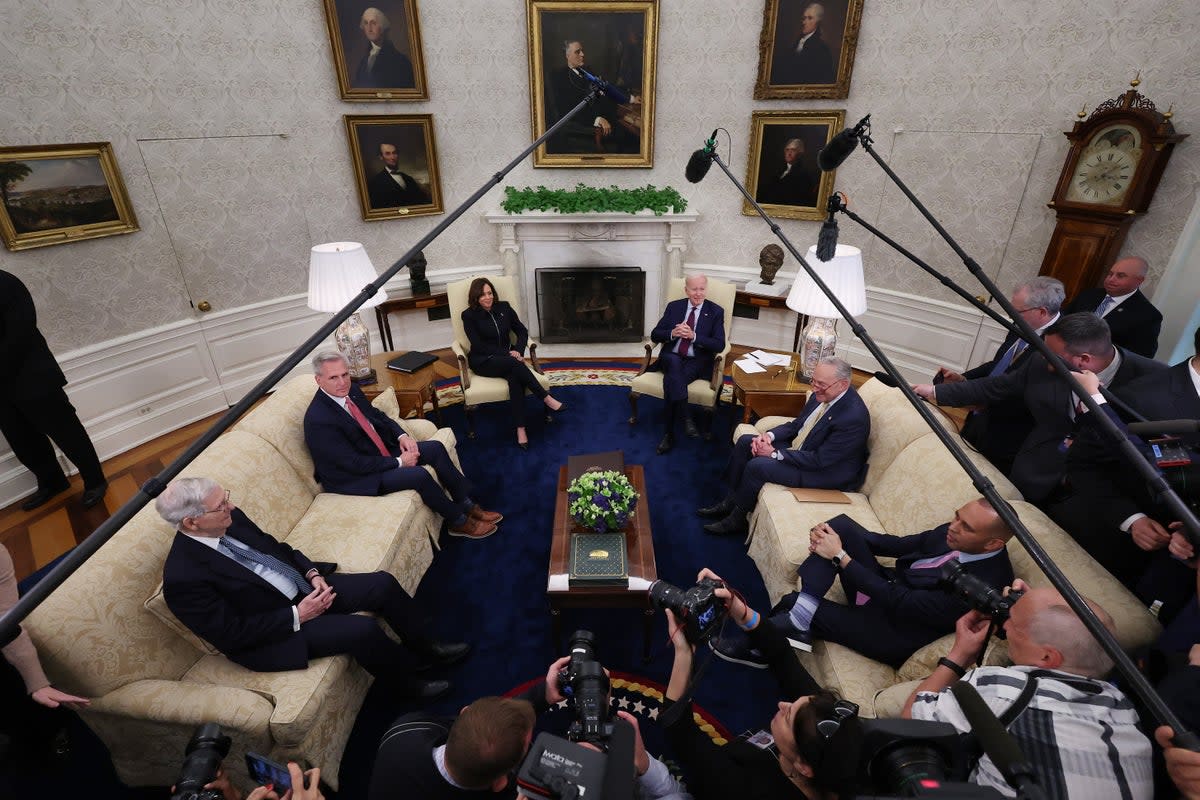Voices: This week will be a test for the entire rationale for Joe Biden’s presidency

- Oops!Something went wrong.Please try again later.
- Oops!Something went wrong.Please try again later.
- Oops!Something went wrong.Please try again later.
President Joe Biden and House Speaker Kevin McCarthy are once again meeting with only a little more than a week until the United States is set to default on its debt.
The talks truly began to kick into overdrive last week after a meeting between the president and congressional leadership, which led to Mr McCarthy appointing Rep Garret Graves (R-LA) as his point person in the debt limit negotiations. Mr Biden, for his part, has named Steve Ricchetti, his counselor, to be his liaison to the House in the debt limit negotiations.
On Friday, it looked like the negotiations hit a snag when Mr Graves told reporters, “We decided to press pause because it’s just not productive” before they ultimately resumed only hours later.
Much has been made about Mr McCarthy’s speakership being on the line in these negotiations. That is true – Mr McCarthy made concessions to conservatives on the debt limit specifically during the marathon 15 rounds of votes for him to get the gavel.
But just as crucially, the whole rationale for a Biden presidency will be on the line this week. Throughout his 2020 presidential campaign, Mr Biden made the case that Democrats and Republicans can still work together. But as he stares down the barrel of a House Republican conference that is far more radicalised than the Republicans he is accustomed to as negotiating partners, he risks undermining the very case for his 2020 candidacy, and ultimately, his 2024 campaign.
Throughout 2019 and 2020, he painted the Donald Trump era as an aberration and said that once he exorcised Trump from the body politic, Republicans would have “an epiphany.” He mostly believed this because of his 36 years in the Senate.
His belief likely solidified because, during his tenure as Barack Obama’s vice president, when a deal seemed impossible, he and Senate Republican Leader Mitch McConnell could concoct a deal to avert a crisis, as was the case when they worked together to raise the debt limit in the summer of 2011. Mr McConnell was all too willing to play along and when Mr Biden bid farewell to the Senate toward the end of Mr Biden’s tenure as the leader of the upper chamber, the Kentucky Republican said, “There's a reason 'get Joe on the phone' is shorthand for 'time to get serious,' in my office.”
Many progressives, and even some mainstream Democrats, have long been skeptical of this argument. In 2020, during the waning days of the Democratic primary, Sen Elizabeth Warren slammed Mr Biden and Sen Amy Klobcuhar (D-MN) in a debate by saying “Amy and Joe’s hearts are in the right place but we can’t be so eager to be liked by Mitch McConnell, that we forget how to fight the Republicans.” Ms Warren’s mentor and Mr McConnell’s main sparring partner, the late Senate Majority Leader Harry Reid (D-NV), froze Mr Biden out of negotiations during the 2013 government shutdown.
A similar dynamic is playing out now, as many progressives fear Mr Biden will concede too much to Mr McCarthy, specifically when it comes to imposing work requirements for social welfare programs and Medicaid. As a result, they have urged Mr Biden to at least be willing to invoke the 14th Amendment of the US Constitution to raise the debt limit unilaterally.
Nevertheless, Democratic voters, mostly in hopes that they could beat Mr Trump and also return to some semblance of normalcy, nominated Mr Biden. And for the past two years, despite Democrats having a trifecta in the House, Senate and the White House, only sparingly chose to go the partisan route and instead found ways to get Republicans to work with him on infrastructure, guns, codifying protections for same-sex and interracial couples and the manufacturing of semiconductors in the United States. He also resisted calls to completely abandon the filibuster in the Senate.
But this Republican House is different. Unlike the more genteel Senate or the olden Republican House majorities led by John Boehner or Paul Ryan, both of whom Mr Biden personally liked even as he sparred with them, Mr McCarthy leads a GOP conference full of Republicans who are fully willing to shoot the hostage if need be and there are simply not enough Republicans to make up the difference if those conservatives defect.
Mr Biden has framed himself as the responsible voice in the room, even expressing some openness to work requirements. But if talks fall apart, even if Republican intransigence and Mr McCarthy’s inability to whip votes remain the cause of default, voters might second guess why they voted for Mr Biden and question whether to give him another term.

